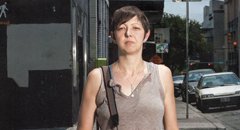LGBT Veterans Project Discussion at JSC

LGBT Veterans Project Discussion at JSC
Photographer to discuss multimedia project that features lesbian and gay military vets on Nov. 1.
October 18, 2016
Jo Ann Santangelo, an Austin, Texas-based photographer and documentarian, will discuss her multimedia project that features lesbian and gay military veterans Tuesday, Nov. 1, at Johnson State College. Her talk, free and open to the public, will be from 6 to 7:15 p.m. in 207 Bentley Hall.
Santangelo’s project and self-published book, “Proud to Serve: Portraits of Lesbian, Gay, Bisexual and Transgender Veterans,” focuses on 65 veterans around the country who were in the military during the “don’t ask, don’t tell” period that barred openly gay people from serving. From 2008 to 2010, she talked with veterans, some of whom were discharged because they were gay.
The project had its beginnings in the summer of 2008, when Santangelo worked as a pedicab operator in Austin, Texas. Many of her customers were in the military or were veterans because of the Army’s Fort Hood nearby. One afternoon, as she pedaled a service member to his hotel, he started talking about his experience in the military. “He just broke down. He said he was done and didn’t want to go back…because he was gay and tired of hiding who he was,” Santangelo recalls. “I couldn’t get it out of my head.”
Eventually, though, she got it on film and in print. Her multimedia project “Proud to Serve” is the result.
She started the two-year project during the troop surge in Iraq to fulfill a requirement while attending the International Center of Photography’s documentary photography and photojournalism program in New York City. The veterans Santangelo features were either in the closet or discharged – including some who were in Iraq – because of the “don’t ask, don’t tell” policy, which has since been repealed.
“People were asked and people told all the time,” she says. With those who served silently, “Most had to lie and hide who they were. They had to leave double lives,” she notes. “They couldn’t live with integrity.”
She documented most of the veterans during a 28-day, 10,000-mile trip across the U.S., supported by a Kickstarter campaign that raised more than $5,000. The project was exhibited at The Center, an LGBT community space in Manhattan, in 2010. It has since been on exhibit at other places, including a military installation, the Naval Base San Diego.
Many veterans talked about “how they had a partner and couldn’t put a picture of them on their desk. They had to be wary of the pronouns they used – little things you don’t think about,” Santangelo says. Others realized they were LGBT while they were in the military.
The hardest part of being in the closet for them? “The lying,” Santangelo says. “Having to lie about who you are takes a toll on people.” Some veterans had years of mental health counseling because of it after they left the service. One vet talked about “feeling the shame,” Santangelo recalls. “He had to get over the fact that they made him feel ashamed of who he was.”
A retired Air Force major, who served for 13 years, told Santangelo he was discharged after military officials searched his private emails. Women talked about what they called lesbian “witch hunts” in the ’80s.
Of those who were discharged, “They were angry, of course. Their career was cut short. But every one of them said, ‘I loved the military. I would go back if I had a chance.’ That was their career,” Santangelo says. “It shocked me that most of them said they would go back in, but this was their family, their community. They liked the structure and the travel. They liked serving their country,” she says. Since the repeal of “don’t ask, don’t tell,” some of them have re-entered the military.
For Santangelo, 42, who lives with her wife in Austin but doesn’t have a military background, talking with the veterans was emotional. The former fashion photographer’s work now focuses on marginalized communities. Her work has appeared in The New York Times, The Washington Post and other publications.
As a teenager, she took photos of strangers in her native Boston. She does that now in Austin, riding her bike on city streets and shooting black-and-white portraits. “It’s not a money thing. It’s just something I like to do,” Santangelo says. “My camera is my passport, and people let me in.”
Copies of “Proud to Serve” will be available for purchase at JSC during Santangelo’s talk. President Barack Obama has a copy and sent her a thank-you note.
For more information, visit joannsantangelo.com and watch this video clip.